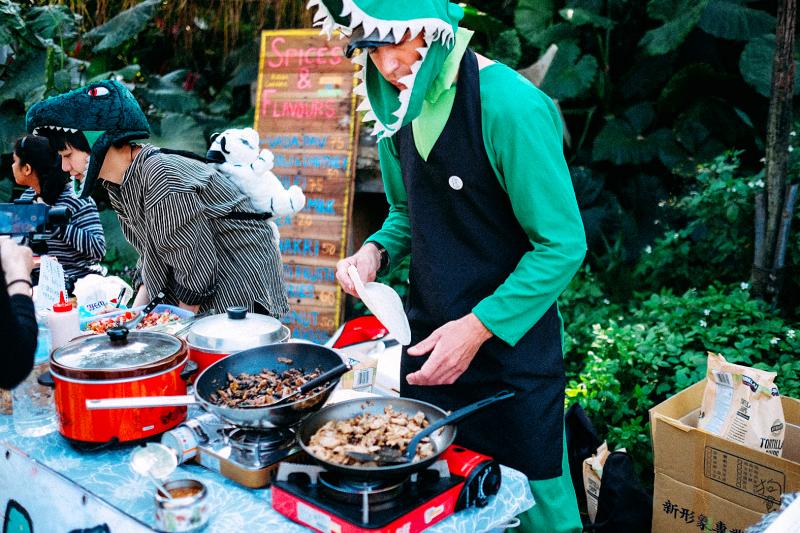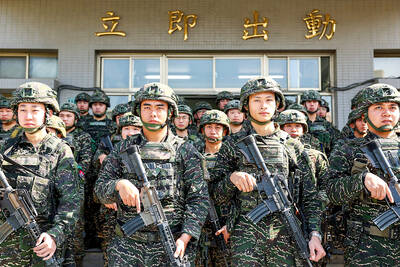This carnival ain’t for carnivores. Tiger Mountain is going meat free tomorrow to celebrate Earth Day with the second Taipei Veggie Fest, dubbed the “freshest party in town” by organizer Sean Scanlan. The extravaganza will feature all vegetarian and vegan food, arts and crafts, workshops and mostly performers who are vegetarian.
As usual, the main acts will rock the electric flower truck stage. This year’s lineup includes Dharma, a death metal band featuring a real life Buddhist nun; Pass the Vibe, a collective known for its hip-hop and freestyle dance battles and Balkan reggae-ska outfit Balkazar.
There will be both sober and beer yoga classes in the abandoned temple stage in the early afternoon, followed by more musical acts and DJ action that begins at the vinyl stage at sundown.

Photo courtesy of Taipei Veggie Fest
Food vendors include Falafel King, Dino Taco, 3 Idiots Curry, La Gritona and more. Bring your own plates, bowls, cups and utensils; there will be some cups for rent but no single-use tableware is allowed. Bring your own yoga mat.
■ Tomorrow from 2pm to midnight, Tiger Mountain (微遠虎山), 186-1, Ln 221, Fude St, Taipei City (台北市福德街221巷186-1號)
■ NT$400 in advance, $500 at the door
■ For more information, visit: fb.me/e/TGIktkaO

That US assistance was a model for Taiwan’s spectacular development success was early recognized by policymakers and analysts. In a report to the US Congress for the fiscal year 1962, former President John F. Kennedy noted Taiwan’s “rapid economic growth,” was “producing a substantial net gain in living.” Kennedy had a stake in Taiwan’s achievements and the US’ official development assistance (ODA) in general: In September 1961, his entreaty to make the 1960s a “decade of development,” and an accompanying proposal for dedicated legislation to this end, had been formalized by congressional passage of the Foreign Assistance Act. Two

Despite the intense sunshine, we were hardly breaking a sweat as we cruised along the flat, dedicated bike lane, well protected from the heat by a canopy of trees. The electric assist on the bikes likely made a difference, too. Far removed from the bustle and noise of the Taichung traffic, we admired the serene rural scenery, making our way over rivers, alongside rice paddies and through pear orchards. Our route for the day covered two bike paths that connect in Fengyuan District (豐原) and are best done together. The Hou-Feng Bike Path (后豐鐵馬道) runs southward from Houli District (后里) while the

President William Lai’s (賴清德) March 13 national security speech marked a turning point. He signaled that the government was finally getting serious about a whole-of-society approach to defending the nation. The presidential office summarized his speech succinctly: “President Lai introduced 17 major strategies to respond to five major national security and united front threats Taiwan now faces: China’s threat to national sovereignty, its threats from infiltration and espionage activities targeting Taiwan’s military, its threats aimed at obscuring the national identity of the people of Taiwan, its threats from united front infiltration into Taiwanese society through cross-strait exchanges, and its threats from

March 31 to April 6 On May 13, 1950, National Taiwan University Hospital otolaryngologist Su You-peng (蘇友鵬) was summoned to the director’s office. He thought someone had complained about him practicing the violin at night, but when he entered the room, he knew something was terribly wrong. He saw several burly men who appeared to be government secret agents, and three other resident doctors: internist Hsu Chiang (許強), dermatologist Hu Pao-chen (胡寶珍) and ophthalmologist Hu Hsin-lin (胡鑫麟). They were handcuffed, herded onto two jeeps and taken to the Secrecy Bureau (保密局) for questioning. Su was still in his doctor’s robes at